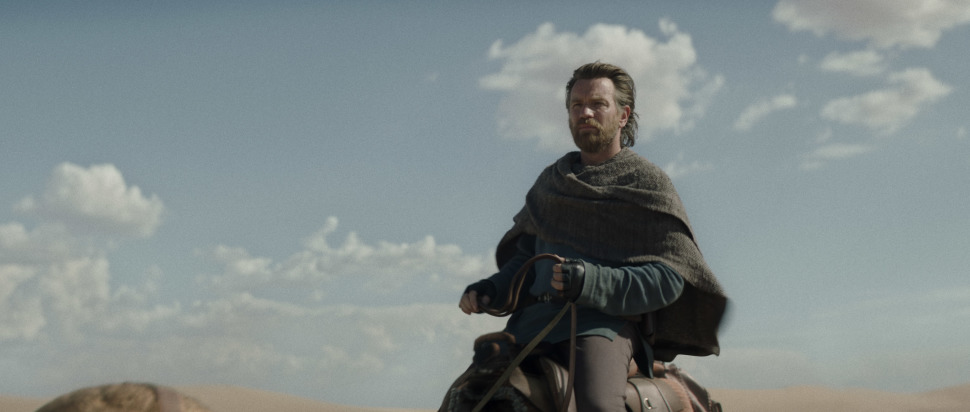A Bad Feeling About This: Solving Star Wars' problems
Recent Star Wars instalments have struggled to deliver the series' mythic tropes without retreading old ground. How does the new series Obi-Wan Kenobi fare?
When Disney bought Lucasfilm in 2012, the potential of a rejuvenated Star Wars brand seemed infinite. A decade on, a patchy record has seen ambition curtailed – particularly on the big screen – amid a growing sense that the company doesn’t quite know how to handle its prized property. When The Force Awakens was released in 2015, reactions primarily ranged from broad enjoyment to ecstatic rapture, but within the dissenting voices, often cited was a feeling of déjà vu in the film’s re-tread of overly familiar story beats. This very issue has come to be something of a defining quandary during the following seven years of Star Wars projects: how to move forwards while also paying homage to, and capitalising on the cultural cache of, the existing stories.
This predicament has come to the fore in various guises: moments of fan service like Darth Vader’s explosive cameo in Rogue One; vitriolic responses to Rian Johnson’s defying of expectation in The Last Jedi; laboured and unimaginative placatory decisions that plagued the next instalment, The Rise of Skywalker. The same dichotomy was evident in the best and worst moments of recent Disney+ shows The Book of Boba Fett and The Mandalorian – the latter is held up as an example of Lucasfilm managing to strike the right balance.
This ongoing issue has recently resurfaced in the shape of Ewan McGregor’s return in the limited series Obi-Wan Kenobi. It is not McGregor’s return itself that has caused umbrage. While the prequel films were often lambasted, McGregor’s portrayal of a young Alec Guinness was considered a highlight by many. However, the notion of a series depicting a period in which that character is, canonically, a hermit living in the desert, left some significantly less than enthused.
New Star Wars films seem to have been placed on indefinite hiatus but the Disney+ upcoming roster is overflowing with familiar names in titles like The Book of Boba Fett, Andor and Ahsoka. It’s difficult to disagree with the underlying point and there is no denying that forcing stories to navigate in increasingly labyrinthine narrative spaces with predetermined conclusions runs the risk of becoming tiresome.
There is also, though, the consideration that Star Wars trades in a marriage of the new and the familiar, and it always has. In recent times, there has been regular reference to a quote in which Star Wars creator George Lucas described the films as like poetry – in as much as the stanzas rhyme. These rhymes are effectively the mythic tropes that Lucas used to construct the first six chapters of the story and they continue to supply a blueprint: the déjà vu people felt watching The Force Awakens was also present when watching The Phantom Menace, as both are rhymes that complement A New Hope. In the same way that John Williams’ music for Star Wars is adept at picking out motifs and developing them in new ways, so the Star Wars mythos returns to scenarios, visuals, and dialogue but also, when it's successful, it – crucially – takes them in new directions.
Ultimately, the reception to the different titles seems to have correlated fairly closely with how well the project was perceived to have calibrated this required balance. Lucasfilm’s head honcho Kathleen Kennedy recently implied that the casting of Alden Ehrenreich as a young Han Solo was the reason for the failure of Solo. But that doesn't quite scan. People went wild for Donald Glover’s take on the beloved character Lando Calrissian, after all. Perhaps it's also possible that the film missed the mark with its rhymes? At the other end of the scale, The Mandalorian seemed bold and free while actually leaning heavily into familiarity; its two main characters are slightly reimagined versions of fan favourites, and it is mired in existing lore while co-opting guest star appearances from characters previously seen in animated shows like The Clone Wars and Rebels.
And so, to Obi-Wan Kenobi. In the first few episodes, the show felt like it was doing little new with format or material, but as it found its feet it became a compelling set of character studies – not least in the way it deepened the complex relationship between Obi-Wan and Darth Vader. It was filled with allusions to prior stories, including an episode that riffed on the last section of the popular video game Jedi: Fallen Order and concepts that borrowed liberally from the original, prequel and sequel trilogies, as well as animated series.
While the lack of central jeopardy might understandably have put certain people off – several main characters are known to still be alive and well ten years after these events – it did deliver three impressive character arcs and a suitably sombre tone, along with memorable action set pieces. Did the world need to know what Obi-Wan was up to in the desert? Perhaps not, but this felt like a Star Wars offering that delivered an emotionally satisfying vignette while both breaking some new ground and sticking the delivering of a well-composed rhyming scheme.
Obi-Wan Kenobi is streaming now on Disney+
